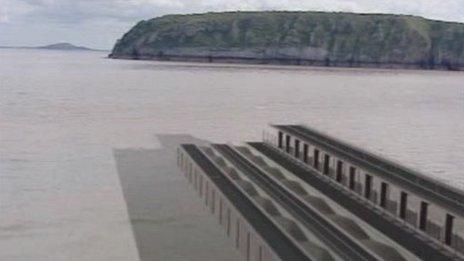Severn barrage: wildlife impact will be addressed, Hain promises
- Published

An artist's impression of one model of the planned Severn barrage
The Welsh MP leading plans to build a £30bn barrage across the Severn estuary has promised environmental groups their concerns will be addressed.
Former Welsh Secretary Peter Hain said he was very encouraged by Prime Minister David Cameron's interest.
Supporters say the barrage would provide 5% of the UK's electricity and create thousands of jobs.
Mr Hain said they would look at the impact on wildlife but the RSPB said it remained concerned at loss of mudflats.
The UK government previously rejected plans for a publicly-funded project after a two-year feasibility study found the cost of building the barrage from the Vale of Glamorgan to Somerset could be up to £34bn, double the initial estimate.
Assurances
Mr Hain, who gave up his post in Labour's shadow cabinet to devote more time to promoting the barrage, said the latest proposals from the Corlan Hafren consortium would not need a single penny of taxpayer's money.
It is claimed the barrage would result in 20,000 jobs being created during construction and 30,000 long term, in addition to helping meet the UK's targets for renewable energy.
The Neath MP told BBC Wales that a meeting with Mr Cameron had been very positive, with the consortium needing the UK government's support in principle to pass planning and regulatory hurdles.
The RSPB has previously said that a conventional barrage would be "an environmental disaster" and possibly be in breach of the EU habitats directive, while Friends of the Earth have said that other technologies would have "less damaging consequences".
Mr Hain said the new plan would reduce the risk of flooding, but admitted there were concerns about the impact on local wildlife.
"The RSPB, with who the consortium has engaged positively, still has got very serious questions that need to be answered," he said.
"The anglers also have met us and talked to us as well," he added.
Mr Hain said the consortium would see the various environmental groups at a stakeholders' meeting in the coming weeks, and that full details of the proposal would be released when appropriate.
"When it has sufficient confidence that the government at least is going to give it in-principle backing then of course all that detail will be published," he said.
Sceptical
Gwyn Williams, head of protected areas at the RSPB, welcomed adjustments to the proposals, but said they remained sceptical.
Speaking on BBC Radio Wales, he said: "The immediate impact of the scheme on the loss of mudflats is likely to be less, but over time we fear that erosion of mudflats will continue as the estuaries adjust to the new scheme.
"That will mean loss of mudflats to birds that fish could still be endangered by being trashed in the turbines and ultimately big problems for flood defence within in the inner estuary.
"We need a renewables revolution - this is about getting the right technology in the right place.
"We still remain concerned that the Severn is not the right place and a barrage is not the right solution.
"We need to think about it very, very carefully because whatever we do is going to be in place for over 130 years - if we get it wrong it's going to be very costly and difficult to put right."
Downing Street confirmed that the prime minister met Mr Hain and Corlan Hafren in July to discuss the barrage plan.
A spokesman said: "The government is keen to promote a diverse range of energy supply and will consider the proposals carefully."
- Published19 August 2012
- Published25 July 2012
- Published26 April 2012
- Published14 May 2012
- Published14 May 2012
- Published18 April 2012
- Published7 December 2011